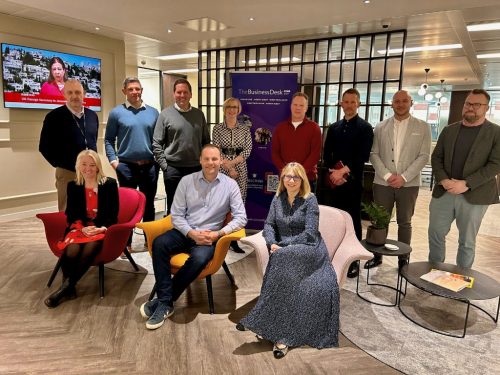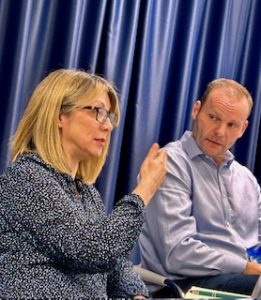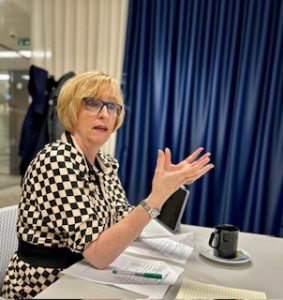The future of work and the impact of AI

The world of work and the pace of change has accelerated in the last four years.
Anyone running any type of organisation has had to fundamentally rethink how they recruit and retain staff, manage their teams, and make best use of office space and time.
With the support of Curium Solutions TheBusinessDesk.com brought together a collection of smart business thinkers from different sectors around the North West for a round table.
We wanted to discuss how even those without a technology background can embrace the challenges that advancing technological change are demanding.
How are businesses preparing for change and how are they planning their strategies around investment in workspaces, their own people, and product development?
The round table was held at Gilbanks in Manchester, a premium serviced office and meeting room provider.
The conversation revolved around the future of work, with all the participants sharing their insights on adapting to changing nature of work.
They emphasised the need to balance flexibility, technology, and human elements, while also discussing the challenges of navigating uncertainty in workplace strategy. Speakers also explored the potential of AI to augment human work, while acknowledging the limitations of AI in tasks that require creativity and critical thinking.
The conversation highlighted the importance of strategic planning, data mapping, and flexibility in designing workspaces that accommodate changing needs.
 Andy Dawson, director and co-founder of Curium Solutions, set the scene and provided context on Curium’s transition from three founders to a broader team structure as they focus on growth and digital transformation.
Andy Dawson, director and co-founder of Curium Solutions, set the scene and provided context on Curium’s transition from three founders to a broader team structure as they focus on growth and digital transformation.
Many of the guests reflected on how the COVID-19 pandemic profoundly disrupted work patterns and accelerated the implementation of technology.
Richard Bertram of TSK, which consults on workplace design and build, emphasised the importance of engaging rather than mandating employees in workplace changes.
“So it’s always got to be about what what are we doing to enable people to do their roles to the best of their ability. And if the tech helps, great, but we all employ people into our businesses, because we trust them, and we think they’re going to do a good job for us. So therefore, allow everything we give them to do that really good job,” he said.
Strategy consultant Carolyn Hicks of Grant Thornton said flexibility must be retained while accommodating different life stages.
Hill Dickinson lawyer Debra Cooper shared the challenges of balancing work and family responsibilities during lockdowns and the aftermath.
Andy Dawson described how he saw some companies now require more collaborative office space and flexibility due to uncertainty of where people worked from.
Commercial real estate consultant Richard Lace of OBI said he viewed flexibility as crucial for unpredictable technological advancement. “I visited two law firms in recent weeks,” he said, “and I went into one, and it was probably 80% full and another and it was, 10 or 15%. Even within the same sectors, there’s no one size fits all different sectors work in different ways different teams do
Development director Dan Hyde of MEPC highlighted the deep thinking that’s been going in to the design and build at the NoMa estate they are developing in Manchester city centre, creating a welcoming environment with amenities and community to attract employees to new buildings like Manchester’s Angel Square.
 Architect John Crellin of John Matthews Architects discussed how their office designs have prioritized wellness, placemaking and social value for 15 years. Dan Hyde emphasized future-proofing buildings through smart technology was now wholly focused on occupier experience.
Architect John Crellin of John Matthews Architects discussed how their office designs have prioritized wellness, placemaking and social value for 15 years. Dan Hyde emphasized future-proofing buildings through smart technology was now wholly focused on occupier experience.
David Jaworski, director of sales with Australian tech company Safety Culture described how redesigning Safety Culture’s office to improve collaboration increased employee flexibility and satisfaction.
“We decided to move to a new office space, and the company hired somebody globally who’s in charge of workplace experience. Their sole job is to create the best possible experience for their employees across every office globally.
“We also took people on the journey as well. So we created some focus groups, as we were kind of in the design phase, to try to recognise what they would want in some of those spaces. And I can honestly say, since we’ve moved in, a few months ago, we’ve seen a massive shift, we’re not mandating days, but we’ve seen a huge shift of people just naturally been drawn back into the office. So that’s really been a positive change for us.”
Implementing a four-day workweek received mixed opinions. Andy Dawson believed learning required work experience while Carolyn Hicks and Debra Cooper highlighted challenges in client-facing roles, but both felt that the way work is constructed seems inefficient.
On flexible work there was more consensus and the meeting’s representative of the younger generation, Curium’s digital marketing executive, Jodie Adkins, said she absolutely prioritised flexibility in her package of employee benefits, possibly as a legacy of the pandemic.
“As soon as everyone went home and started working from home, I hated, I hated logging onto my computer, to virtually train somebody, because what I actually enjoyed was the interaction with people.
“It took me a while to really find a balance, but I can honestly say that I wouldn’t go to an employer where flexibility wasn’t an option, I’d value flexibility over salary and things like that. And that’s the opinion of quite a lot of peers of my age. It’s more important to me to have more time to do things that are outside of work. My weekends are super important to me. My evenings are important to me, seeing family, going on trips, things like that. And it’s all about balance. If I was at work all the time, I would become resentful of it. And so I really enjoy the flexibility because like I say that humans are actually super important.”
 Dan Hyde noted the need to accommodate neurodiverse employees was felt much more acutely now. “Apparently 25% of the workforce will be neurodiverse in the future. And to cater for that as well, they so often struggle within standard offices and office culture, but can be very, very high performing, you want all your people in your workforce performing.”
Dan Hyde noted the need to accommodate neurodiverse employees was felt much more acutely now. “Apparently 25% of the workforce will be neurodiverse in the future. And to cater for that as well, they so often struggle within standard offices and office culture, but can be very, very high performing, you want all your people in your workforce performing.”
But the conversation also covered the impact of AI on work which was considered from various perspectives. Carolyn Hicks said AI would change but not eliminate jobs.
Curium chair Tracy Westall noted the pandemic highlighted that not all jobs allowed remote work.
“What the pandemic did show us is not everybody works in the same way. If we roll that forward and think about the future of work, we can’t use that as the template because AI, for example, will affect a lot of those workers.”
Debra Cooper felt AI could assist complex legal work but not replace human creativity. Innovation advisor Chris Dugdale-Wilde of Drees & Sommer UK warned of challenges adopting AI while emphasising strategy and awareness.
Data management was deemed fundamental to the success of AI as long as it’s aligned with strategy.
Carolyn Hicks discussed challenges collecting and using data overwhelming some clients.
“We don’t have a conversation with a client that doesn’t talk about technology and digital. But we are still seeing a real fear about what that AI is and where it could take them and then how they male those strategic decisions about what to do because it is an absolute unknown risk.
“We can’t really predict how this is going to play out. So there are a whole lot of organisations who are just going to sit back and wait and see. And there are those that will be a little bit more braver, and kind of test things out. So it’s very much a hot topic of discussion, with lots of testing out things in a very small way at the moment is what what we’re seeing.”
Debra Cooper described unorganised data across systems challenging large institutional clients.
Dawid Jaworski said Safety Culture has implemented quite a few AI tools over the past year and seen a big shift in the way people are currently working.
“What we see is upskilling people across our workforce on how to use the AI tools effectively to help them with the current workload,” he said.

Tracy Westall
Tracy Westall reflected on generational differences in work priorities compared to the experiences of her daughter who works as a paramedic.
Andy Dawson concluded the meeting by emphasising the importance of leadership in customising change management approaches to each organisation’s unique circumstances and balancing technology, work culture and people.
“I think future success is about how you can pull them together and do it in a way that’s right for your business, your team, your people, your place. And I think that’s what differentiates the future success,” he said.









